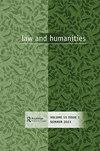“如果你是一只动物,你会吃掉我的”:动物的人民和企业殖民主义的历史
IF 0.2
Q3 LAW
引用次数: 1
摘要
Indra Sinha的小说《动物的人民》虚构了1984年联合碳化物公司在印度博帕尔发生的有毒气体泄漏事件。Animal在灾难中受了重伤,他引导读者了解后世界末日的社会景观,以及社区为追究“Kampani”对泄漏后果的责任所做的失败努力。通过我认为是其历史先例的镜头阅读Animal的故事,我追溯了联合碳化物公司和东印度公司之间的连续性,以揭示这两个时刻公司对人类的共同替代。将《动物的人民》与这部更广泛的法律史进行对话,我认为英国殖民时代提出的人性术语使辛哈所描绘的一次性人性的画像合理化。本文的指导性问题是,法律领域如何塑造和引导文学中所代表的人类的想象可能性?本文章由计算机程序翻译,如有差异,请以英文原文为准。
‘If you were an animal you would have eaten me’: Animal’s People and the history of corporate colonialism
ABSTRACT Indra Sinha's novel Animal's People provides a fictional account of the 1984 Union Carbide toxic gas leak in Bhopal, India. Animal, who is severely injured in the disaster, guides the reader through both the post-apocalyptic social landscape, as well as the community's failed efforts to hold the 'Kampani' accountable for the consequences of the leak. Reading Animal's story through the lens of what I identify as its historical precedent, I trace the continuities between the Union Carbide Corporation and the East India Company in order to reveal in both moments a shared substitution of the corporation for the human. Bringing Animal's People into dialogue with this broader legal history, I argue that the terms of humanity set forth in the British colonial era rationalize the portrait of disposable humanity that Sinha paints. The guiding question of the paper is how does the legal realm shape and guide the imaginative possibilities of the human as represented in literature?
求助全文
通过发布文献求助,成功后即可免费获取论文全文。
去求助
来源期刊

Law and Humanities
LAW-
CiteScore
1.00
自引率
0.00%
发文量
21
期刊介绍:
Law and Humanities is a peer-reviewed journal, providing a forum for scholarly discourse within the arts and humanities around the subject of law. For this purpose, the arts and humanities disciplines are taken to include literature, history (including history of art), philosophy, theology, classics and the whole spectrum of performance and representational arts. The remit of the journal does not extend to consideration of the laws that regulate practical aspects of the arts and humanities (such as the law of intellectual property). Law and Humanities is principally concerned to engage with those aspects of human experience which are not empirically quantifiable or scientifically predictable. Each issue will carry four or five major articles of between 8,000 and 12,000 words each. The journal will also carry shorter papers (up to 4,000 words) sharing good practice in law and humanities education; reports of conferences; reviews of books, exhibitions, plays, concerts and other artistic publications.
 求助内容:
求助内容: 应助结果提醒方式:
应助结果提醒方式:


